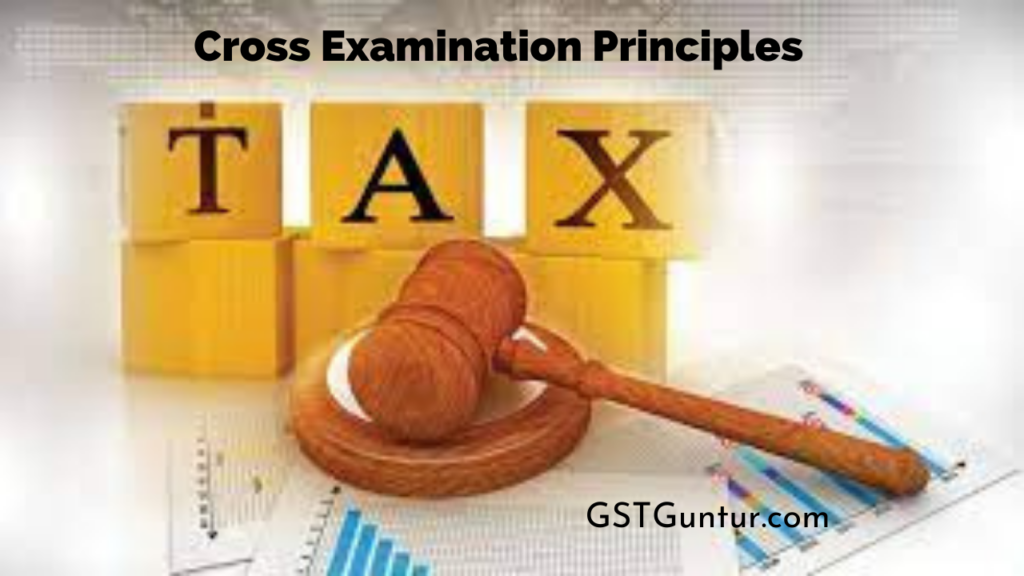Cross Examination Principles: Cross-examination is the process by which a party appearing before the court asks the party of the opposition witnesses to establish the truthfulness of its claims. These are issues a lawyer addresses to a witness of an opponent in order to receive privileged information from that witness. In this article, let’s learn everything about Cross examination in Indian law detail.
- What is Cross Examination?
- Purpose of Cross Examination
- Witness Examination
- Principles of Cross Examination in India
- Rules for Cross Examination
- Objective of Cross Examination
- Cross Examination of Different Types of Witness
- FAQs on Cross Examination
What is Cross Examination?
The cross-examination of a witness by the opposing party is referred to as the cross-examination. In law, cross-examination is the questioning by an opponent of a witness. Cross-interview is not just about attacking an opponent, but about reinforcing your own case.
Every party has the right to interview a witness made by its adversary in order to determine whether the witness knows what he is testifying and whether he has been shown to have the means to ascertain what he or she is testifying about, and so all his or her memory, motivation and motives may be examined through cross-examination.
Purpose of Cross Examination
The purpose of cross-examination is to assess the witness’ credibility. It has been designed by the law to establish the truth and is certainly one of the most effective tests. This means the situation of the witness regarding his interests, his causes, his inclinations and his prejudice in respect to the parties and the subject of litigation, his means for obtaining the correct and certain knowledge of the facts he attests to how these means have been used, its power in the first instance to determine the facts and its capacity for retention and terminations.
Witness Examination
In accordance with the terms of Section 135 of the Indian Evidence Act, the court has the authority to order or command the witnesses. The evaluation of a witness asks the witness questions about the relevant facts in the case and records the witness statements as proof.
Principles of Cross Examination in India
The method of obtaining truth by cross-examining is as ancient as human nature. Multi-testing is often regarded as the toughest test of a defender’s ability and perhaps requires an exercise of ingenuity over and above his other duties. Cross-examination with credible skills is very difficult to perform.
Rules for Cross Examination
Barristers have a certain level of knowledge of the art and are best able to explain these principles. Cross-examination means proof of an opposing witness before a court of law. This is done in accordance with questions and the following working rules:
- Come as quickly as you can
- Any witness argue not
- Do not ask if there is no good reason
- Don’t jerk around, except when you are so bad in your position and can do anything to improve it
- Don’t ask a question without being quite sure that the answer is good for you
- When a witness obviously lies, leave him alone completely.
Objective of Cross Examination
The purpose of cross-examination is to get something, regardless of how little you can help your own case. When it’s impossible for you to get something that helps your client, try to weaken ‘your opponent’ by a different process. In order to distinguish the truth from misconception, especially when your opponent’s witness is helping with your case.
Cross Examination of Different Types of Witness
The cross examination of different types of witness are explained below:
- False Witness: Anyone who gives false evidence deliberately is a false witness.
- Truthful Witness: The true witness is said to be the hardest cross-examination of all. He trusts and wants his proof to be true. The easiest thing to do is to deal with it because it is not wrong. It has no secret meaning and it readily and mentally gives its answers.
- Witnesses Hostile: A witness who is opposed to the party which calls them and who does not want to tell the truth may have questions to put.
- Biased Witness: A witness may be biassed if the relationship with his or her cause, or to the parties, is such that he or she can exaggerate or falsify or suppress the truth or state what is false. Violation is what stimulates “a willingness to see and report things as they want, instead of as they are.“
- Expert Witness: The professional and non-professional expert witness can be classified into two classes. A farmer who is called upon to give proof of a correct method of cure may be considered to be a kind of non-professional course and a doctor called to give proof of a party’s mental condition may be considered a profession.
- Court Witness: The judge has the power in civil and criminal cases to call and examine witnesses. Both parties can cross-examine them in accordance with Section 165, Evidence Act. This cross-examination is not limited to the matters on which the court has examined him.
FAQs on Cross Examination
Question 1.
Who can cross examine in Indian Law?
Answer:
The Party may cross-examine the witnesses, who have the right to take part in any investigation or trial.
Question 2.
What is the range of cross examination?
Answer:
There is an unlimited range of cross-examination, with the only limitations being that it is “related to the relevant facts.”
Question 3.
What is cross examination of witnesses called by the court?
Answer:
If the witness called by the court objects to the complaint, the witness would have the right to interrogate him.
